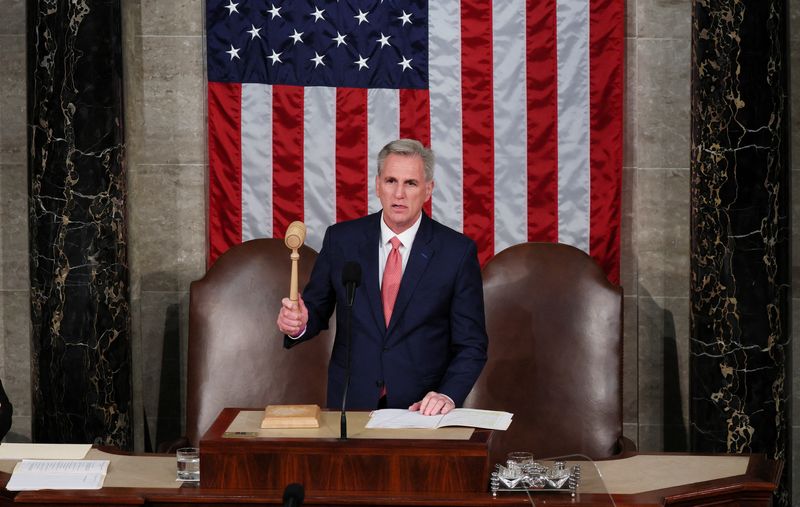By Michael Martina
WASHINGTON (Reuters) -U.S. House Speaker Kevin McCarthy plans to meet Taiwan's President Tsai Ing-wen in the U.S. in coming weeks, two sources told Reuters on Monday, a move that could replace the Republican Speaker's anticipated but sensitive trip to the democratically governed island claimed by China.
The sources, who spoke on condition of anonymity, said Tsai had been invited to speak at the Ronald Reagan Presidential Library during a transit through California on a planned visit to Central America, and that McCarthy was likely to meet her in the United States.
One of the sources said should the U.S. meeting go forward - likely in April - it did not necessarily rule out McCarthy visiting Taiwan in the future.
McCarthy's office did not respond immediately to Reuters' questions on the matter, including whether the planned meeting was an effort to avoid raising tensions with China, which was angered by then-House Speaker Nancy Pelosi's visit to Taiwan in August.
The Financial Times first reported the plans to meet in California.
During a CNBC interview earlier on Monday, McCarthy declined to answer whether he would visit Taiwan, saying he would announce any travel plans when he had them.
Four other sources - including U.S. officials and people with knowledge of the U.S. and Taiwan administrations' thinking - said both sides were deeply uneasy that a future visit by McCarthy would severely increase tensions across the Taiwan Strait at a time when the island is preparing for its own presidential election early next year.
The Reagan Library and China's Embassy in Washington did not respond immediately to requests for comment.
Taiwan's de facto embassy in Washington said it had "no information to share" when asked about the meeting.
"In general terms, arrangements for President Tsai's visits to Taiwan's diplomatic allies and transits through the United States are carried out in line with the usual practice," it told Reuters.
China views engagements between U.S. and Taiwanese officials as a breach of its sovereignty, a perceived slight sharpened by the fact that the Speaker of the House is second in line to the U.S. presidency.
But Taiwanese presidents, including Tsai, have a record of traveling through the U.S. en route to other countries, though the U.S. government has generally avoided meeting with senior Taiwanese officials in Washington.
Pelosi, a Democrat, visited Taiwan and met Tsai last year, defying warnings from China, which launched military drills around the island in response, raising fears that Beijing may carry out its threat to take Taiwan by force if necessary.
Since then, Taiwan has welcomed a wave of U.S. lawmakers, and speculation has swirled around whether McCarthy would travel there this year. McCarthy last year expressed interest in visiting Taiwan if he became speaker, a role he assumed in January after Republicans took control of the House in November's midterm elections.

Like most countries, the U.S. does not have formal diplomatic ties with Taiwan, but is bound by U.S. law to provide the island with the means to defend itself.
Washington has long stuck to a policy of "strategic ambiguity," meaning it does not make clear whether it would respond militarily to an attack on Taiwan. However, President Joe Biden said in September that U.S. forces would defend Taiwan in the event of a Chinese invasion, his most explicit statement on the issue.